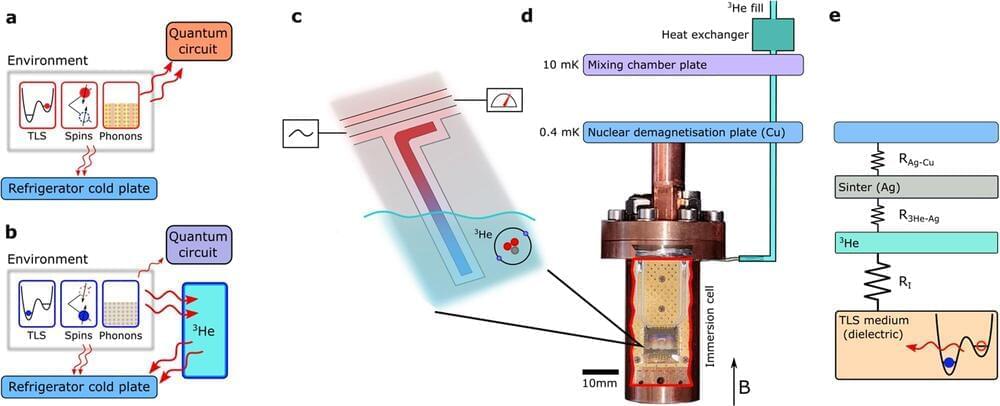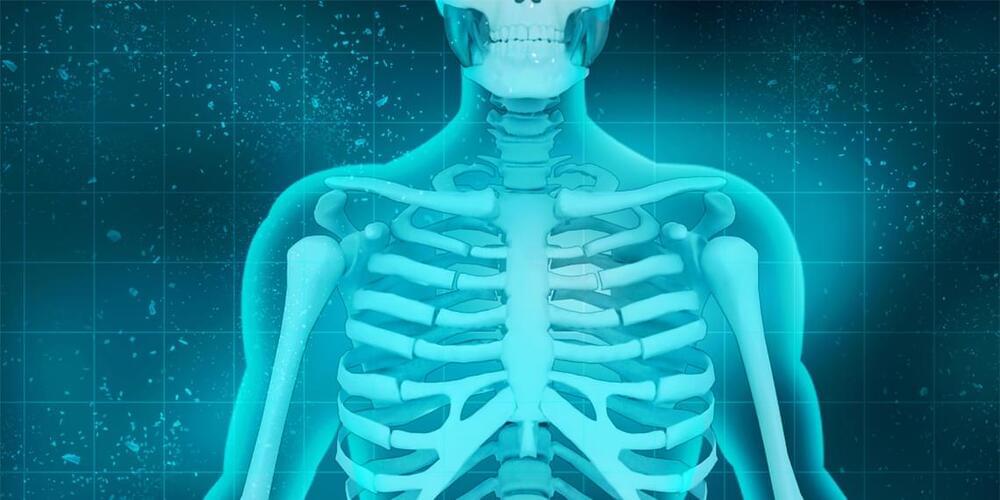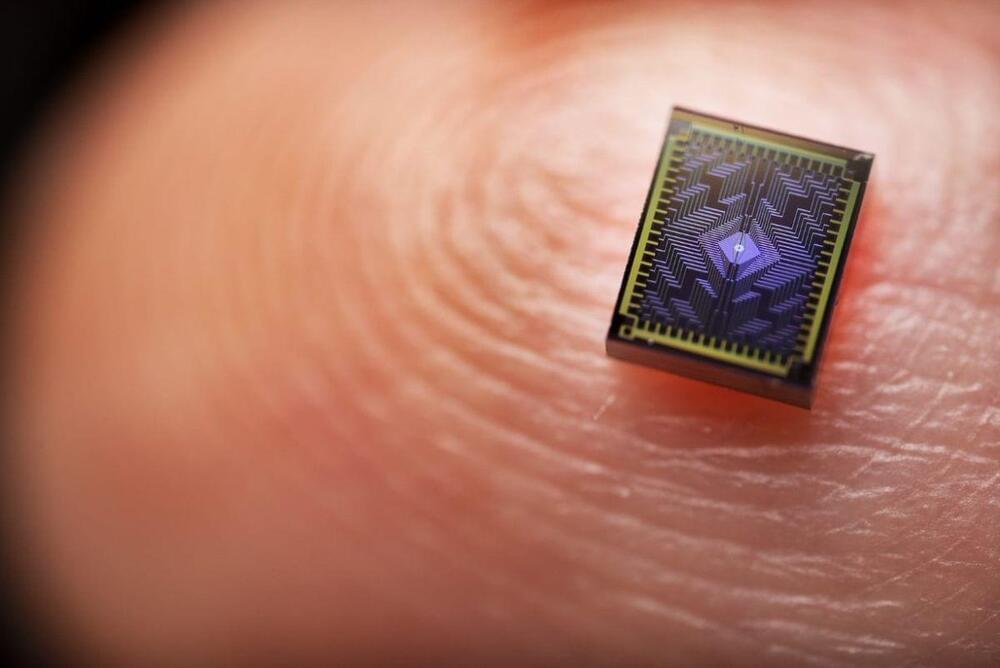Dubai 10X creates disruptive, exponential change in government entities. Dubai 10X is about shifting mindsets and behaviors to aim big, learn from failure and adopt risk-taking.
Page 2792
Jun 16, 2023
New cooling technology developed for quantum computing circuits
Posted by Paul Battista in categories: computing, quantum physics
Typical superconducting quantum circuits, such as qubits—basic processing units of a quantum computer, must be operated at very low temperatures, of a few 10s of millikelvin, or hundredths of a degree from absolute zero temperature. These temperatures are today easily accessible in modern refrigerators. However, the intrinsic temperature of devices turns out to be much higher because the materials required to make good qubit circuits are by their nature very poor thermal conductors. This thermalization problem becomes more and more acute as the scale and complexity of circuits grow.
Much like water (or liquid nitrogen) cooling is sometimes used to effectively cool down high-performance digital computers, a quantum computer could benefit from similar liquid cooling. But at the very low temperatures that quantum circuits operate, most liquids will have turned into ice. Only two isotopes of Helium, Helium-3 and Helium-4, remain in the liquid form at millikelvin temperatures.
In recent work published in Nature Communications, researchers from the National Physical Laboratory, Royal Holloway University of London, Chalmers University of Technology and Google developed new technology to cool down a quantum circuit to less than a thousand of a degree above absolute zero, almost 100 times lower temperature than achieved before. This was made possible by immersing the circuit in liquid 3 He, chosen for its superior thermal properties.
Jun 16, 2023
Baldness breakthrough? New RNA treatment may stimulate hair growth
Posted by Paul Battista in categories: innovation, particle physics
Scientists say they were able to stimulate hair growth in mice by utilizing an RNA particle, a development that could eventually lead to another treatment for baldness in humans.
Jun 16, 2023
Sam Altman’s World Tour, in 16 Moments
Posted by Gemechu Taye in categories: biotech/medical, economics, existential risks, robotics/AI

A video worth watching. An amazingly detailed deep dive into Sam Altman’s interviews and a high-level look at AI LLMs.
Missed by much of the media, Sam Altman (and co) have revealed at least 16 surprising things over his World Tour. From AI’s designing AIs to ‘unstoppable opensource’, the ‘customisation’ leak (with a new 16k ChatGPT and ‘steerable GPT 4), AI and religion, and possible regrets over having ‘pushed the button’.
Jun 16, 2023
Giant New Nazca Lines Are Discovered in Peru Through Use of AI
Posted by Josh Seeherman in category: robotics/AI
These are the type of applications I find super intriguing about what AI can help us discover…I wanna know how/why the pyramids of Giza were constructed 🙂.
These giant geoglyphs have been hiding in plain sight for millennia. Thanks to AI, we’ve finally discovered them!
Jun 16, 2023
Why Apple’s Vision Pro is the Next iPhone (Analysis)
Posted by Raphael Ramos in category: mobile phones

In today’s episode, we take a deeper look into what Apple’s Vision Pro could mean for the industry. It’s not the same class of product as an iPhone, people aren’t going to walk around with these on their head, but the headset is the IPhone’s 3D successor.
ColdFusion Podcast:
Continue reading “Why Apple’s Vision Pro is the Next iPhone (Analysis)” »
Jun 16, 2023
Men with anxiety disorders have reduced bone mineral density in their lumbar spine and femoral neck
Posted by Genevieve Klien in categories: biotech/medical, health, neuroscience, privacy
A study in Australia found that men with anxiety disorders tended to have reduced bone mineral density in their lumbar spine and femoral neck bones. This association was found even when controlling for sociodemographic, biometric and lifestyle factors, other diseases, and medication use, but disappeared when participants with a history of mood disorders were excluded from the sample. The study was published in Acta Psychiatrica Scandinavica.
Bone mineral density refers to the quantity of minerals, primarily calcium and phosphorus, present in a segment of bone. It serves as an indicator of bone strength and density.
Studies have shown that certain psychiatric disorders might negatively impact bone health. These include unipolar depression, bipolar disorder, schizophrenia and anorexia nervosa. A meta-analytic review of 21 studies conducted in 2016 reported a very clear link between depression and reduced bone mineral density in several regions.
Jun 16, 2023
Genome editing used to create disease-resistant rice
Posted by Genevieve Klien in categories: biotech/medical, food
Researchers from the University of California, Davis, and an international team of scientists have used the genome-editing tool CRISPR-Cas to create disease-resistant rice plants, according to a new study published in the journal Nature June 14.
Small-scale field trials in China showed that the newly-created rice variety, developed through genome editing of a recently discovered gene, exhibited both high yields and resistance to the fungus that causes a serious disease called rice blast. Rice is an essential crop that feeds half of the world’s population.
Guotian Li, a co-lead author of the study, initially discovered a mutant known as a lesion mimic mutant while working as a postdoctoral scholar in Pamela Ronald’s lab at UC Davis. Ronald is co-lead author and Distinguished Professor in the Department of Plant Pathology and the Genome Center.
Jun 16, 2023
Nvidia board member dumps $48 million more in stock amid monster rally
Posted by Genevieve Klien in category: computing
A longtime board member at Nvidia Corp. dumped more than $48 million worth of the chip maker’s shares earlier this week, cashing in on the stock’s recent surge.
Harvey Jones, who has been on the Nvidia NVDA, +2.12% board since 1993, sold nearly of the company Tuesday at prices between $400 and $408.51, according to a filing with the Securities and Exchange Commission made public Wednesday. He pocketed $48.3 million through the transaction, which took place with shares that he held in his living trust.
Jun 16, 2023
Intel Announce ‘Tunnel Falls’ Quantum Research Chip
Posted by Genevieve Klien in categories: computing, information science, quantum physics
Intel announced the next step on its road to quantum with the release of its latest quantum chip, a 12-qubit, silicon-based chip the company is calling “Tunnel Falls”. No, no, it’s okay, you can keep those greenbacks in your wallet: Intel isn’t in the commercialization phase yet. Instead, Tunnel Falls is meant to be a research test chip: it’s still a stepping stone towards the actual Quantum Processing Units of the future. Hopefully, those will be more like Intel’s own Tunnel Falls than Iran’s Amazon-based “quantum computing” technology.
“Tunnel Falls is Intel’s most advanced silicon spin qubit chip to date and draws upon the company’s decades of transistor design and manufacturing expertise. The release of the new chip is the next step in Intel’s long-term strategy to build a full-stack commercial quantum computing system. While there are still fundamental questions and challenges that must be solved along the path to a fault-tolerant quantum computer, the academic community can now explore this technology and accelerate research development.” says Jim Clarke, Intel’s director of Quantum Hardware.
While it may be underwhelming to know that Tunnel Falls is just a research test chip, it’s also an often overlooked necessity for any new technology. Before any work can be done within the quantum computers of the future, the algorithms, the learning and the how-to have to be started today. One issue with that is the difficulty in producing quantum computing hardware; there’s a reason such a small number of big companies — from Intel to Microsoft, IBM, IonQ, and Google — are actively developing quantum computing hardware.
















